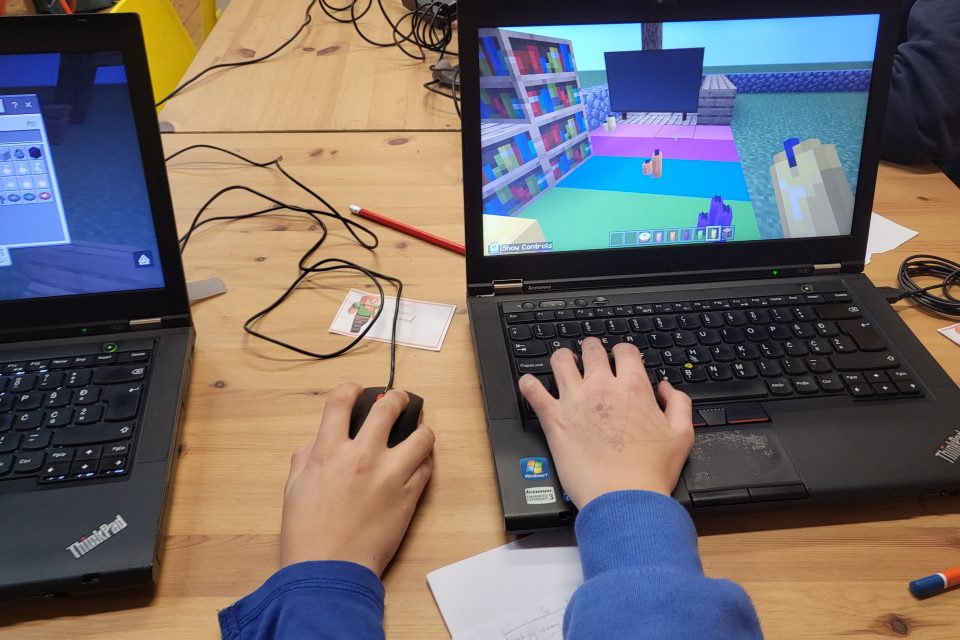Microsoft teamed up with Digital School and the Association of Friends of Youth Ljubljana Moste-Polje to organise a Minecraft challenge hackathon entitled “Dream Classroom”. Thirty children from disadvantaged families had the opportunity to try programming for the first time, using Minecraft Education Edition to design their dream classroom. The event was also supported by the Ministry of Education, Science and Sport.
What is your idea of a dream classroom in which you would love to learn?
This simple question sparked many creative ideas in children aged 10 to 15 who participated in the Minecraft challenge – from a biology and chemistry classroom under an aquarium to a relaxation room with beds, sofas, scented candles and the indispensable relaxing hot tub. The popular and award-winning game Minecraft, where players explore a blocky 3D world to find resources, make tools, and build structures, brought ideas to life during the hackathon. The special educational version of the game – Minecraft: Education Edition – also provides a safe learning platform to foster creativity, collaboration and problem-solving in a digital environment. It is suitable for students of all skill levels, who can learn and have fun by simply assembling bricks, or venture into the world of coding in Java Script and Python programming languages.
“The hackathon, where children in groups of three explored and built their own complete classroom, showed that with a little help every young person can take their first steps in programming and even have fun doing it,” said Matija Torlak, CEO and founder of Digital School. “We want to provide access to workshops that are creative and offer a personalised and safe learning environment to as many children as possible, regardless of their prior knowledge.”
“During the epidemic, we discovered that many young people unfortunately lacked the appropriate computer equipment. However, equipment alone is not enough. Young people also need the skills necessary to use it to learn and explore,” said Tanja Petek, Secretary of the Association of Friends of Youth Ljubljana Moste-Polje. “The Association values this kind of collaboration highly. Free workshops don’t just promote computer literacy, which is increasingly important, they also allow us to provide children from socially disadvantaged families and unsupportive family backgrounds the skills they need for teamwork, cooperation and problem-solving – skills they will desperately need later in life.”
We need to inspire more young people to get involved in computing and programming
“At a time when digital technologies are running the world, the priority is to bring the opportunities they offer to everyone. We want to give young people – regardless of their gender, age or background – the opportunity to experience the creative world of programming and computing and increase the odds of their taking up these subjects and careers, which are in high demand both in Slovenia and the rest of the world. But even if they decide to take a different career path entirely, computer skills will benefit them in any modern workplace,” said Marina Wolpoti, Industry Executive Education for Slovenia, Croatia, Bosnia and Herzegovina and Albania at Microsoft.
“In Slovenia, we are also facing the challenge of inspiring more girls to take up computing. They are less likely to choose careers in the IT industry later on, even though it offers many opportunities for creativity and personal development. Our 2022 Digital Futures Index survey has shown that we need to do more in this area because the share of women among ICT professionals in Slovenia is lower than the average for Central and Eastern Europe,” added Wolpoti.
Microsoft’s Digital Futures Index also shows that Slovenian companies employ fewer ICT professionals than the regional average and find it harder to recruit them due to the below-average share of graduates trained for ICT professions. According to some estimates, more than five thousand new ICT professionals would be needed annually. However, less than 40 percent of this target arrive on the job market currently (GZS). Other European countries are also facing a shortage of skilled ICT staff, and to accelerate the digital transition, the European Commission’s Digital Decade vision set a target of 20 million ICT professionals in the EU in 2030, roughly more than double the current number, and 80% of adults with at least basic digital skills.
Dream classrooms created as part of the Minecraft challenge:

“A rest area with beds, sofas, scented candles and a library full of books, and of course a hot tub for a relaxing rest.”

“Our perfect classroom is located on an island, so we need to take a boat to get to it. There is a large library in the classroom with a rest area with a lake and a walking path over the lake.”

“I liked the fact that we were playing Minecraft and learning about it. I was very surprised (in a good way) because we weren’t just coding, we were also playing.” (Marko)





